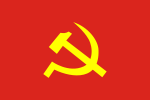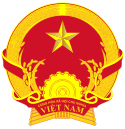Communist Party of Vietnam
| Communist Party of Vietnam Đảng Cộng sản Việt Nam |
|
|---|---|
 |
|
| Leader | Nông Đức Mạnh, General Secretary |
| Founded | February 3, 1930 |
| Headquarters | Ba Đình district, Hà Nội |
| Newspaper | Nhân Dân |
| Youth wing | Ho Chi Minh Communist Youth Union |
| Membership (2006) | 3,100,000 |
| Ideology | Communism, Marxism-Leninism, Ho Chi Minh Ideology, Market Socialism |
| Website | |
| Communist Party of Vietnam Online Newspaper | |
| Politics of Vietnam Political parties Elections |
|
| Vietnam |
 This article is part of the series: |
|
|
|
|
Other countries · Atlas |
| Communist parties |
|---|
 |
|
Africa
|
|
Americas
|
|
Asia
Historical parties |
|
Europe
Historical parties |
|
Middle East
|
|
Oceania
|
|
Related topics
|
The Communist Party of Vietnam (Đảng Cộng sản Việt Nam) is the ruling, as well as the only legal political party in Vietnam. It is a Marxist-Leninist Communist Party supported by (and a part of) the Vietnamese Fatherland Front. In most of the cases, the Vietnamese press and people refer to the Communist Party of Vietnam as "Đảng" (Party) or "Đảng ta" (our Party).
Contents |
History
The Party was founded by Hồ Chí Minh and other exiles living in China as the Vietnamese Communist Party (Việt Nam Đảng Cộng Sản) at a conference in Hong Kong February 1930.[1] At the Hong Kong conference two competing communist factions, Indochinese Communist Party (Đông Dương Đảng Cộng Sản) in Tonkin and the Communist Party of Annam (An Nam Đảng Cộng Sản) in Cochinchina, merged. Although the third Vietnamese communist group, the Indochinese Communist League (Đông Dương Cộng Sản Liên Đoàn) in Annam, had not been invited to the Hong Kong conference its members were allowed to become members of the new united party.
The Hong Kong conference (held in Kowloon City) elected a nine-member Provisional Central Committee, consisting of 3 members from Tonkin, 2 from Annam, 2 from Cochinchina, and 2 from the overseas Chinese community.[2] The latter group had previously been organized within the South Seas Communist Party.
Soon thereafter, at its first plenum the party changed its name to the Indochinese Communist Party (Đảng Cộng Sản Đông Dương), on directions from Comintern.[2]
The First National Party Congress was held in secret in Macau in 1935. At the same time, a Comintern congress in Moscow adopted a policy towards a popular front against fascism and directed Communist movements around the world to collaborate with anti-fascist forces regardless of their orientation towards socialism. This required the ICP to regard all nationalist parties in Indochina as potential allies.
The party was formally dissolved in 1945 in order to hide its Communist affiliation and its activities were folded into the Marxism Research Association and the Viet Minh, which had been founded four years earlier as a common front for national liberation. The Party was refounded as the Vietnam Workers' Party (Đảng lao động Việt Nam) at the Second National Party Congress in Tuyen Quang in 1951. The Congress was held in territory in north Vietnam controlled by the Viet Minh during the First Indochina War. The Third National Congress, held in Hanoi in 1960 formalized the tasks of constructing socialism in what was by then North Vietnam, or the Democratic Republic of Vietnam (DRV) and committed the party to carrying out the revolution of liberation in the South. At the Fourth National Party Congress held in 1976, the Worker Party's of North Vietnam was merged with the People's Revolutionary Party of South Vietnam to form the Communist Party of Vietnam.
Party membership doubled from 760,000 in 1966 to 1,553,500 in 1976, representing 3.1 percent of the total population of the country, and was close to two million by 1986.
Ideology
The Communist Party of Vietnam has adopted Marxism-Leninism and Ho Chi Minh Ideology to be ideological basis of the Party and the Revolution. Though formally Marxist-Leninist, the Communist Party of Vietnam has moved towards market reforms in the economy (see also Đổi Mới, the Renewal launched by the Sixth Congress of the Party in 1986) and has permitted a growing mid-level private sector. However, the Party retains a monopoly on power.
Organization
The Communist Party of Vietnam is organised according to the Leninist principle of Democratic centralism.
The supreme party organ is the National Congress which, since 1976, is held every five years. Due to the war footing during the wars against French and U.S. troops, the first 4 congresses were not fixed to the common time schedule. After the Foundation Conference, 10 national congresses of CPV have been held:
| National Congress | Date | Location | Number of participants |
Number of total Party's members |
Notable events |
|---|---|---|---|---|---|
| 1st Congress | 27 - 31/ 3/1935 | Macau (China) | 13 | 600 | Restoring the Communist movement in Vietnam. |
| 2nd Congress | 11 - 19/02/1951 | Tuyên Quang | 158 (53 alternates) | 766,349 | Changed the name to Labour Party of Vietnam. |
| 3rd Congress | 05 - 12/ 9/1960 | Hà Nội | 525 (51 alternates) | 500,000 | Building the Socialism in North Vietnam, carrying out the revolution movement in South Vietnam. |
| 4th Congress | 14 - 20/12/1976 | Hà Nội | 1008 | 1,550,000 | The First Congress held after the unification of Vietnam. |
| 5th Congress | 27 - 31/ 3/1982 | Hà Nội | 1033 | 1,727,000 | |
| 6th Congress | 15 - 18/12/1986 | Hà Nội | 1129 | ~1,900,000 | Promote the đổi mới (innovation) policy. |
| 7th Congress | 24 - 27/ 6/1991 | Hà Nội | 1176 | 2,155,022 | |
| 8th Congress | 28 - 01/ 7/1996 | Hà Nội | 1198 | 2,130,000 | |
| 9th Congress | 19 - 22/ 4/2001 | Hà Nội | 1168 | 2,479,719 | |
| 10th Congress | 18 - 25/ 4/2006 | Hà Nội | 1176 | ~3,100,000 |
The National Congress elects the Central Committee, consisting of 160 full members and 21 candidates.[3] The Central Committee usually meets twice a year.
The Politburo, currently consisting of fourteen members, determines government policy, while the Secretariat, currently consiting of eight members, oversees day-to-day policy implementation. The Party's Central Military Commission, which is composed of select Politburo members and additional military leaders, determines military policy.
The activities of Politburo and Secretariat are directed by the Secretary-General (called First Secretary 1960-1976). The Secretary General is considered the Party's leader, though between 1951 and 1969, the position of President of the Central Committee, held by Ho Chi Minh, was considered supreme.
Although there has been some effort to discourage membership in overlapping party and state positions, this practice continues. Currently four Poltiburo members hold high positions in the government.
List of Party leaders
Hồ Chí Minh was Chairman of the Communist Party of Vietnam from 1951 to 1969. The position of General Secretary (called "First Secretary" for the period 1960 to 1976 ) was held by:
- Trần Phú (1930-1931)
- Lê Hồng Phong (1935-1936)
- Hà Huy Tập (1936-1938)
- Nguyễn Văn Cừ (1938-1940)
- Trường Chinh (1941-1956)
- Lê Duẩn (1960-1986)
- Trường Chinh (1986)
- Nguyễn Văn Linh (1986-1991)
- Đỗ Mười (1991-1997)
- Lê Khả Phiêu (1997-2001)
- Nông Đức Mạnh (since 2001)
Current party leadership
The present Politburo, elected in April 2006, consists of:
- Nông Đức Mạnh, Secretary-General of the Communist Party
- Lê Hồng Anh (General), Minister of Public Security
- Nguyễn Minh Triết, Secretary of the Ho Chi Minh City Municipal Party Committee (until 2006), President of Vietnam (since 2006)
- Nguyễn Tấn Dũng, first Deputy Prime Minister, then Prime Minister of Vietnam
- Trương Tấn Sang, Head of the Party's Central Committee's Commission of Economic Affairs, then Standing Member of the Secretariat of the Party
- Nguyễn Phú Trọng, first Secretary of the Hanoi City Municipal Party Committee, then Chairman of the National Assembly
- Phạm Gia Khiêm, Deputy Prime Minister
- Phạm Quang Nghị, first Minister of Culture and Information, then Secretary of Ha Noi Municipal Party Committee
- Nguyễn Sinh Hùng, first Minister of Finance, then Deputy Prime Minister
- Nguyễn Văn Chi, Head of the Party's Central Committee's Commission of Inspection, later also Secretary of the Communist Party
- Hồ Đức Việt, first Chairman of the National Assembly’s Committee for Science, Technology and Environment, then Head of the Party's Central Committee's Commission of Organisational Affairs)
- Phùng Quang Thanh, first Deputy Minister of Defense and Chief of the General Staff, then Minister of Defense
- Trương Vĩnh Trọng, first Head of the Party's Central Committee's Commission of the Interior, then Deputy Prime Minister and Secretary of the Communist Party
- Lê Thanh Hải, first Chairman of the Ho Chi Minh City People's Committee, then Secretary of Ho Chi Minh City Municipal Party Committee[4]
The Secretariat of the Communist currently consists of[5]:
- Nông Đức Mạnh
- Trương Tấn Sang
- Trương Vĩnh Trọng
- Nguyễn Văn Chi
- Hồ Đức Việt
- Lê Văn Dũng, senior lieutenant-general, Chairman of the Political General Department of the Vietnam People's Army
- Tòng Thị Phóng, first Chief of the Party's Central Committee's for People Campaigning, then Deputy Chairwoman of the National Assembly)
- Tô Huy Rứa
At the ninth conference of the Party Central Committee, which closed in 2009 Hanoi, Tô Huy Rứa, Chief of the Central Committee for Propaganda and Education, was elected to the Politburo. Ngô Văn Dụ, a member of the Central Communist Party Committee, Chief of the Central Communist Party Committee Office and Hà Thị Khiết, also a member of the Central Communist Party Committee and Chief of the Central Committee for People Campaigning, were elected to the Secretariat of the Central Communist Party Committee.
See also
- Nhân Dân (The People)
- Tenth National Congress of the Communist Party of Vietnam
- Politburo of the Communist Party of Vietnam
- Central Committee of the Communist Party of Vietnam
Lists:
- List of Communist Parties
- List of political parties in Vietnam
References
- ↑ Smith, R.B., 'The Foundation of the Indochinese Communist Party, 1929-1930', Modern Asian Studies, 32,4 (1998), p.799
- ↑ 2.0 2.1 Ho Chi Minh and the Communist Movement
- ↑ [1]
- ↑ Vietnam latest news - Thanh Nien Daily
- ↑ [2]
External links
- Official English language web site
- Nhân Dân (The People): the official party newspaper
- The birth of the Communist Party of Vietnam (Article recalling the party's founding in 1930.)
|
|||||||||||